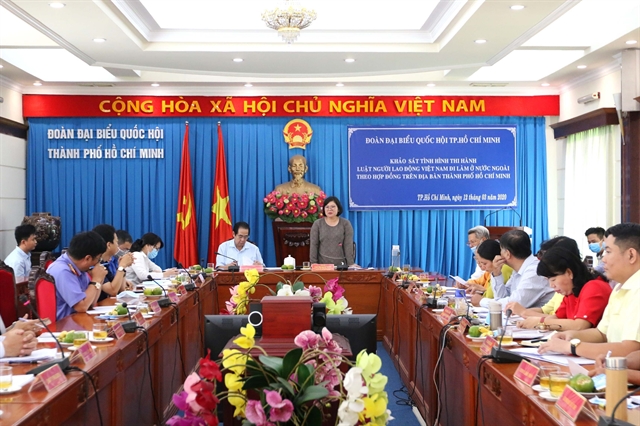 Society
Society


|
| Delegates from the National Assembly in HCM City meet representatives from enterprises to address problems related to labour export. VNA/VNS.Photo Thanh Vũ |
HCM CITY— HCM City has been sending workers abroad under various programmes in recent years, but challenges still exist, especially in training, according to the city's Department of Labour, Invalid and Social Affairs.
Lê Minh Tấn, head of the department, said that most workers who have returned after the expiration of their contracts had saved a large amount of money and were using it to do business and upgrade their accommodations.
Many of them have also found jobs. More than 4,915 people worked abroad within the 2015-19 period, mostly in Japan, Taiwan, South Korea and others.
As many as 86 enterprises and branches in the city send workers abroad, but several enterprises have recruited a large number of workers who have not been trained to work abroad.
These workers later failed to meet the demands of highly skilled jobs.
Lê Long Sơn, director of Esuhai Co.Ltd, said that many labour export enterprises did not have long-term strategies for market development and brand name building.
The situation has led to unhealthy competition, leading to high costs for workers and poor reputation for labour export enterprises.
Sơn suggested that they should focus on skilled workers to meet enterprises’ high demands.
Representatives of other enterprises also suggested that relevant agencies should amend policies and administrative procedures related to issuing new business certificates and change them.
Labour divisions in the city’s outlying districts of Củ Chi, Hóc Môn and 12 said that a framework for co-operation between enterprises and local authorities should be issued to create favourable conditions for management.
The labour department petitioned the Ministry of Labour, Invalid and Social Affairs to give management rights over activities related to labour export to people’s committees in provinces and cities.
Văn Thị Bạch Tuyết, deputy head of the team of National Assembly delegates in the city, said that guest workers who were sent abroad eased unemployment at home and increased incomes of workers, contributing to socio-economic development.
The meeting was held to collect ideas from enterprises and relevant agencies in order to address problems and shortcomings in labour export in the city.
Rural training
The south-central province of Ninh Thuận plans to provide vocational training for 2,600 workers living in rural areas this year, with the aim of providing 82 per cent of them with jobs.
The provincial People’s Committee has launched a vocational training programme for rural workers to match practical job requirements, meeting new-style rural standards and contributing to socio-economic development.
Funding for the programme will be mainly sourced from the State budget for the national new-style rural area programme.
After attending a three-month training course, trainees will be eligible for new jobs and improve labour skills that can contribute to increasing labour productivity and income.
The programme will focus more on improving skills for female workers, especially people with disabilities, and ethnic minorities, poor and near-poor households, policy beneficiaries, and people who have rendered meritorious service to the revolution, or lost their jobs or farmland.
Trần Văn Trưa, deputy director of the province’s Department of Labour, Invalids and Social Affairs, said the department would have policies to support vocational training, and encourage production and business models.
“Vocational training for rural workers should be based on the demands of enterprises and cooperatives,” he said.
Application of effective vocational training models, and cooperation with enterprises, traditional trade villages and specialised farming areas are also needed.
The department and relevant agencies will work together to choose suitable occupations for training that could serve economic and labour restructuring in the agricultural sector.
The department has set a goal to have at least 50 per cent of agricultural workers trained in enterprises, 20 per cent in cooperatives and farming areas, and 30 per cent in social security agencies.
The province has 19 public and non-public vocational education facilities, training 8,500 people each year. They provide training in 13 occupations at college level, 20 occupations at intermediate level, and 49 occupations at elementary level.
More than 500 enterprises operate in the province in the fields of agriculture, forestry and fishery, and 50 agricultural co-operatives have high demand for workers. — VNS




